- Home
- Claudia Mills
One Square Inch Page 7
One Square Inch Read online
Page 7
Spencer blew out the candles in one breath, so he’d get his wish, whatever it was.
I wasn’t sure what I would have wished if it had been my birthday and not Spencer’s. I wished my mom would finally finish her quilt project and not start another one; I wished we would get an A on our report about Uruguay.
Over the din, the phone rang. Four boys dove at once to answer it.
“I think it’s for you.” Spencer’s brother Nate tossed the phone to me. Surprised that anyone would be calling me at Spencer’s, I managed to catch the phone before it landed in Spencer’s birthday cake. I wondered how Spencer could be so bad at catching, given all the items that were tossed at him by his brothers.
“Hello?” I said.
I could barely hear the soft voice at the other end.
“Hello?” I said again.
“Hi, Cooper, it’s me. Carly.”
“What’s wrong?”
I strained to hear her answer.
“Mom’s not here, and I went over to Jodie’s house, and nobody’s there, either, and I’m all alone, and I’m scared, Cooper.”
“What do you mean, Mom’s not there?” Mom never left Carly alone; Carly was only seven, she was too young to be left at home by herself.
“She’s not here,” Carly said again. “I was up in my room coloring, and when I came downstairs she was gone. I couldn’t find her anywhere in the house, and then I looked in the garage, and the car is gone, and Spencer’s phone number was on the list on the bulletin board, so I tried to call you, and this lady said I had the wrong number, and I tried again, and, Cooper, can you come home?”
“I’ll be right there,” I said, and hung up.
What could have happened to make Mom leave like that? Maybe she had cut her hand with her sharp sewing scissors and had to drive to the emergency room, bleeding so bad she forgot all about Carly, or maybe she didn’t want to scare Carly with the sight of the blood. I had gone to the emergency room once, when I broke my arm back in third grade, and it took forever once you got there.
“I have to go home,” I told Spencer.
“Is something wrong?” Spencer’s mother asked.
“No,” I lied. “I just have to go home. My mother told Carly to call me and tell me to come. She needs me to help with something.”
“You haven’t even eaten your cake!”
“That’s okay. I’m pretty full from the pizza.”
All I wanted was to go, but I waited while Spencer’s mom sliced three pieces of birthday cake and wrapped them up for me in aluminum foil.
“Can you come back later? After you finish helping?” Spencer said. “We’re going to watch Night of the Living Dead and then another movie I got about mummies.”
“I’ll try,” I promised, but I took my sleeping bag with me, just in case. After jogging the first block, with my sleeping bag bumping against my leg, I realized that I had forgotten the foil-wrapped plate of cake, but that didn’t matter. What mattered was getting home to Carly.
As I entered the front door, I saw her, huddled on the couch. She ran into my arms.
“Oh, Cooper!”
“It’s okay. See? I’m here now, and everything’s fine.”
I heard Mom’s car pulling into the garage. I expected to see her race into the room, pale with worry, her hand swaddled in a huge bandage, or even in a cast, but in she strolled, looking just like her regular self.
“What?” she said when she caught sight of my angry face.
“Where were you?”
“I just ran out to do an errand.”
“Carly was here all by herself!”
Mom looked irritated. “She can be alone for ten minutes, Cooper. She’s alone longer than that when she walks by herself to and from school.”
“You were gone for a lot more than ten minutes.”
“I was only planning to stop at the crafts store to run in and get one thing, Cooper, something that I needed for Carly’s Hansel and Gretel set. I wasn’t out shopping for myself. It didn’t seem worth dragging Carly along with me when I was only going for such a short time to a store half a mile away. But then on the way home, I felt sleepy. I was up late last night, working on my quilt.”
And the night before that. My bedroom was next to her studio, and I’d heard her sewing machine whirring all night long.
“So I pulled over and took a short nap, which is the sensible and safe thing to do. Would you rather I fell asleep at the wheel?”
“I was just worried, that’s all.” I hesitated. “Maybe you should sleep more at night.”
She gave a laugh. “Says the boy who probably isn’t going to sleep for ten minutes tonight at Spencer’s sleepover. Speaking of which, why are you here?”
“Carly called me. She was scared being at home alone.”
“Carly, honey,” Mom said, gathering Carly into a hug. “There was nothing to be scared of. I was coming right back.”
But you didn’t come right back, I wanted to say. “I’m here now, Coop, so why don’t you head on over to Spencer’s?”
“I already had the pizza and cake.” Well, the pizza. Not the cake. “So I think I’ll just stay here.” I didn’t want to leave Carly, in case Mom disappeared again.
Up in my room, I turned on my computer and Googled “doesn’t sleep.” The screen filled with posts by parents who were trying to get their babies to sleep through the night. I Googled “too many projects” and retrieved a screen full of articles on time management. Spencer and I used to try typing in all kinds of weird things like “you are stupid” and “big fat loser,” just to see what would come up. So now I Googled “My mom has changed.” But I didn’t find any Web site that told me why she had changed, or what I could do about it.
11
Thanksgiving was coming, and in Food Fun, Mr. Pasta taught us how to make a piecrust. He started by explaining that it couldn’t be explained.
“You can read a dozen books on how to make piecrust; there are entire Web sites devoted to the art of making piecrust; a master chef can show you his secrets. But none of this will be of the slightest use unless you can feel it in your fingers.”
Spencer spread out his hands on the table, fingers splayed. “I don’t think my fingers are going to be good at feeling piecrust,” he predicted gloomily.
“There are four ingredients for any piecrust,” Mr. Pasta continued. “Flour, salt, liquid, and fat.”
“Why is everyone looking at me?” Spencer asked, although nobody was. He gave a protective pat to his chubby midsection. I returned Ben’s grin. It was good to be with normal people, people who all thought the same things were funny.
The best kind of fat for piecrust, according to Mr. Pasta, was lard. The word lard alone was enough to send half the class into giggles. The second best was butter. That was what the class was going to use for their pies. Mr. Pasta didn’t want to hear the words margarine or Crisco mentioned in his presence. I made a mental note to strike those words from my vocabulary, not that I had ever uttered the word Crisco in my entire life.
“It is crucial,” Mr. Pasta intoned, “that the fat be very cold.”
“Cold fat,” Spencer remarked. “How appealing.”
“When you combine the fat with the flour, you do not want to blend them. You just want to cover the fat particles with flour. Your flour-covered fat lumps should be no larger than peas.”
“Pea-size fat lumps,” Spencer echoed. “Yum!”
Mr. Pasta gave a warning look to our station. Ben poked Spencer to be quiet.
“Ow!” Spencer exclaimed, but he dropped his voice to a whisper. “How would you like it if I poked you in your fat lump?”
Even Ben had difficulty when it was time to roll out our piecrust. It kept sticking to the counter, and to the rolling pin. First it wasn’t rolled out thin enough, and then it was rolled out so thin that it tore when Ben tried to lift it to place it in the pie pan.
Lindsay’s table was evidently having just as much trouble. She came over to
our table to compare notes.
“Ours must have some glue in it or something. It won’t stop sticking,” Lindsay complained with a grin.
I couldn’t think of anything clever to reply. “Ours keeps sticking, too.”
“At least you got yours in the pie plate.”
“Ben did it.” I wished I was good at everything like Ben, or funny like Spencer. Then again, Lindsay had plainly come to our table to talk to me and not to them.
“We forgot to take Peter Pepper home with us,” Lindsay said. “I didn’t remember him until after my mom was pulling into the garage.”
“I didn’t remember him, either.”
“I wonder if he misses us,” Lindsay said.
“I bet he does. He was a good, faithful pepper.”
“Lindsay!” one of her table mates called to her. “You’re missing out on the total destruction and ruination of the world’s worst piecrust!”
“Gotta go,” Lindsay said.
“Sure,” I said.
The last two minutes had been the best two minutes I had had in weeks.
That day after lunch, outside on the blacktop, I wandered over to where Mr. Stuart was standing on outdoor duty. I wanted to talk to somebody about Mom, and Mr. Stuart was my favorite teacher, not counting Mr. Pasta, whose expertise focused on cooking, baking, and eating.
“Hey, Cooper.” Mr. Stuart laid a friendly hand on my shoulder. “How’s it going?”
I wanted to tell him about how strange Mom had acted at the Community Table, and how she had left Carly alone while she went out shopping, and how the answering machine tape at our house these days was filled with phone calls from credit card companies and long, rambling messages from some homeless man who wanted to be part of Mom’s art show.
Instead I said, “It’s okay.”
There was an awkward silence. “Okay” was a stupid answer to give if I wanted my teacher to ask me what was wrong.
“Anything on your mind?”
“No.” “No” was even stupider.
“Are you sure?”
“Yeah.” I couldn’t talk to him about Mom, I just couldn’t. “It’s all okay.”
I picked up a basketball that had rolled toward my feet and threw it back to the guys playing hoops, and that was the end of the conversation with Mr. Stuart.
For the rest of the afternoon I thought about trying to talk to Ben’s mom, or Spencer’s. But Ben’s mom was so perfect; I didn’t want her to know how not-perfect our family was. And Spencer’s mom was so loud; I could imagine her shouting at me, “What? Your mom did what?” Besides, what if I said something to them about my mom and then they went and talked to her? I mean, the whole point of talking to them would be so that they would go talk to her. And then she’d know that it had all come from me, that I had been the one who had told them, and it would all be so hideous I didn’t think I could stand it.
If only Mom’s doctor would see that there was something wrong and do something about it. But at home that afternoon, when I checked the calendar, there were no more appointments written there, and I didn’t see the bottle of pills next to her bed. Maybe she had stopped taking them, and that’s why she was acting so weird.
What if I tried to talk to her about it? I practiced the first line in my head: “Mom, I think—Mom, you’re acting strange.” Could I actually say it? But Mom had left to run errands, and I had no idea when she’d be back.
While I waited for her to return, I started trying to clean up the kitchen. Instead of complaining about how messy the house was, maybe I could make things better. If the house looked less crazy, it might make her be less crazy, too.
I started with the table. Dirty dishes I rinsed and put into the dishwasher, not that rinsing did anything to dissolve the dried-on, caked-on food residue from days —or weeks?—ago. Yellowing newspapers went into the recycling bin in the garage. I knew Mom wasn’t going to get around to framing Carly’s artwork anytime soon, so I organized it into a neat stack and set it on top of the refrigerator, out of the way. The bolts of fabric I lugged up to her studio. Even if there was no room for it there, it was better to have fabric in a quilting studio than on a kitchen table. The heaps of unpaid bills I put on the counter: maybe she’d be more likely to pay them if she could actually see them. When I reached the scraps of fabric and gold braid from the toy soldier costumes, I threw them in the kitchen trash, and then carried the trash out to the bin.
I had never seen a sight more lovely than the bare expanse of uncluttered tablecloth I finally uncovered. I took the tablecloth outside to shake off a few lingering crumbs, then smoothed it back in place, carefully positioning the salt and pepper shakers in the middle.
It looked like the kitchen table at Ben’s house.
It looked exactly like a normal mother’s kitchen table.
When Mom walked in from the garage half an hour later, I was standing by the table, unable to keep myself from grinning with pride. In the poem “Jabberwocky,” one of Mom’s favorites, there was a line about someone “chortling” with joy. I now knew exactly what it felt like to chortle.
She was about to deposit her shopping bag unthinkingly on the table when she did a double take.
“Cooper!”
“I cleaned it up.”
I waited for her praise.
“What did you do with my things? My fabric? Carly’s artwork? Did you throw them away?”
“I put them away.”
“Where? You had no right! Cooper, I had all this organized, and then you just swoop in and move everything willy-nilly, so now I can’t find it?”
Organized? Dirty dishes next to old newspapers next to unpaid bills next to unframed artwork next to quilting fabric next to scraps of gold braid from toy soldier costumes made a month ago?
“I thought you’d be happy! I was trying to help!”
“When I need help around here, I’ll ask you for it.”
I wanted to ask her whether she was still seeing Dr. Leibowitz. I wanted to tell her how worried I was. But I couldn’t find the words. Instead, I went upstairs and practiced my trombone, good and loud, for half an hour.
By suppertime, she had the table strewed with the results of her afternoon’s shopping—more fabric—and the contents of the crisper from the refrigerator: limp carrots, soggy lettuce, bruised onions, and a moldy piece of ginger root.
It was as if my whole hour of cleaning had never happened.
12
Usually, Gran-Dan didn’t come to Colorado for Thanksgiving, and we didn’t go to New Jersey. The holiday airfares were too high, and the holiday crowds were too large. For the past several years, we had spent the day with Jodie’s family, each family alternating turns as host. If only this year were the year to go to Jodie’s house! But it wasn’t.
“We need to start cleaning up the house,” I told my mom on Monday morning. Carly and I had the whole week off from school.
“Well, go ahead and run the vacuum,” Mom said.
I stared at the living room carpet, entirely covered with her piles of fabric.
“Just vacuum around them.”
“I could carry them upstairs to your studio.”
“After I’ve spent weeks laying them out exactly in this way to get a feel for the color?”
“But it’s just three days until Thanksgiving.”
“Three days,” she repeated, making it sound as if three days was the same as three years.
The day before Thanksgiving, the house looked just the same, if not worse, and while Mom had done some of the other shopping, she hadn’t yet bought the turkey. She liked to get a fresh turkey, not a frozen one, and there was no room in the refrigerator to put it, so she was waiting until the last minute.
“What if they run out of turkeys?” I asked her.
“O ye of little faith,” she replied.
I spent the afternoon baking a pumpkin pie, with an awestruck Carly as my audience, but I cheated and used a frozen piecrust. If even Ben couldn’t make a successfu
l piecrust with Mr. Pasta standing three feet away, I wasn’t going to risk trying it without assistance.
Carly and I went with Mom after supper when she finally decided it was time to go to King Soopers and buy the turkey; her favorite organic food store, where she usually bought her free-range turkeys, was already closed for the day.
“Keep your fingers crossed,” she told us as we parked in the mostly deserted lot.
I crossed them, but it didn’t help. The refrigerator bin in the meat department where the turkeys had been was empty. We even checked the freezer: no turkeys there, either.
“Excuse me,” Mom asked one of the store clerks. “Might you have any turkeys in the back? Could you check for us?”
“Nope,” the man said. “I mean, I wouldn’t mind checking, but I know already what I’d find. Nothing. Nada. Zip. You’re the third person who’s come in tonight asking. And we ordered fifty more turkeys than we did last year.”
“What are we going to do?” I asked, once the man headed off to the deli counter.
“Jodie’s family is coming,” Carly added, as if contributing some new fact to the discussion.
“We should have bought it sooner,” I couldn’t resist saying, though I made sure to say “we” instead of “you.”
Mom’s eyes flared. “How was I supposed to know that King Soopers wasn’t going to order the right amount? You’d think that a major supermarket chain wouldn’t be surprised that their customers want to buy a turkey for Thanksgiving and would plan accordingly.”
“We could have chicken,” I suggested. We could be the only family in America having chicken for Thanksgiving.
“Close enough!” Mom said. She found a roasting chicken and put it in the cart.
“It won’t be the same,” Carly said, her voice wobbling a little bit.
“Maybe we can buy a big cardboard turkey,” Mom said. “You know, one of those ones that fan out and fasten around. At least we’d have some kind of turkey on the table. Let’s go look at the holiday aisle.”

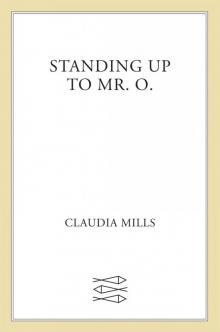 Standing Up to Mr. O.
Standing Up to Mr. O.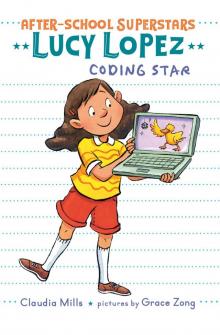 Lucy Lopez
Lucy Lopez Dinah Forever
Dinah Forever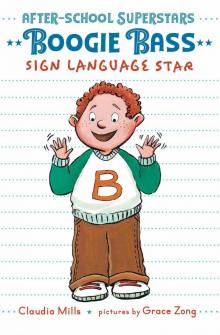 Boogie Bass, Sign Language Star
Boogie Bass, Sign Language Star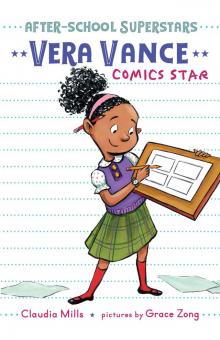 Vera Vance: Comics Star
Vera Vance: Comics Star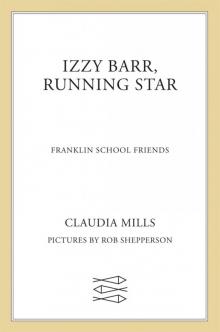 Izzy Barr, Running Star
Izzy Barr, Running Star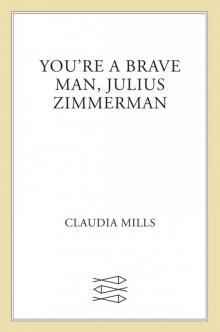 You're a Brave Man, Julius Zimmerman
You're a Brave Man, Julius Zimmerman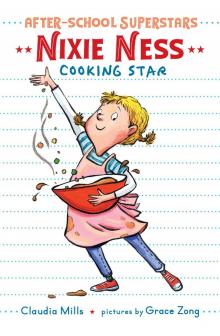 Nixie Ness
Nixie Ness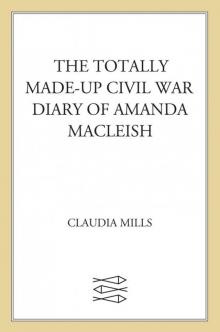 The Totally Made-up Civil War Diary of Amanda MacLeish
The Totally Made-up Civil War Diary of Amanda MacLeish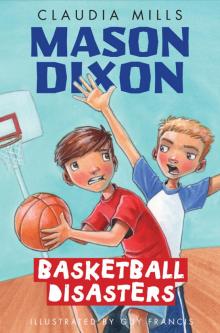 Basketball Disasters
Basketball Disasters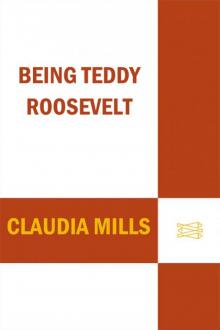 Being Teddy Roosevelt
Being Teddy Roosevelt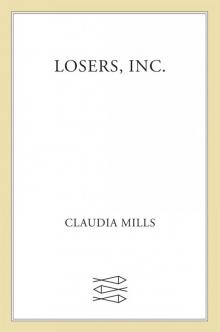 Losers, Inc.
Losers, Inc.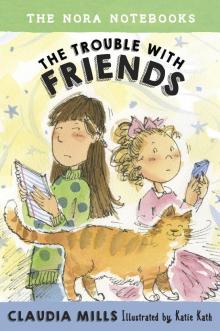 The Trouble with Friends
The Trouble with Friends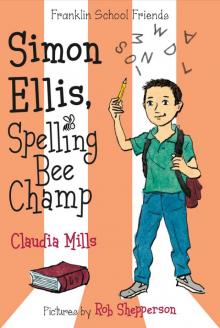 Simon Ellis, Spelling Bee Champ
Simon Ellis, Spelling Bee Champ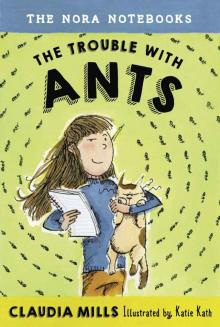 The Nora Notebooks, Book 1: The Trouble with Ants
The Nora Notebooks, Book 1: The Trouble with Ants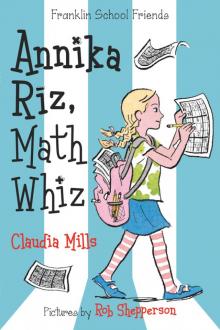 Annika Riz, Math Whiz
Annika Riz, Math Whiz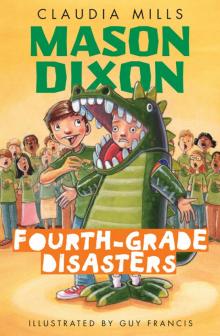 Fourth-Grade Disasters
Fourth-Grade Disasters Pet Disasters
Pet Disasters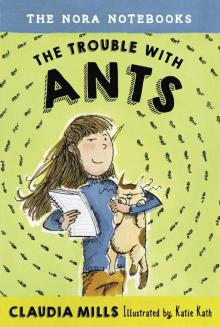 The Trouble with Ants
The Trouble with Ants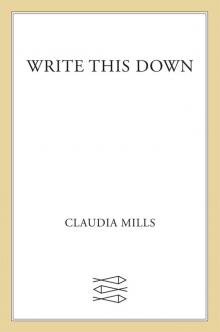 Write This Down
Write This Down Alex Ryan, Stop That!
Alex Ryan, Stop That!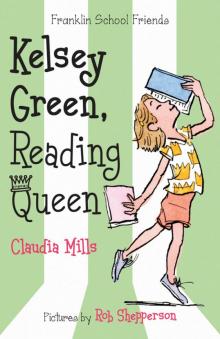 Kelsey Green, Reading Queen
Kelsey Green, Reading Queen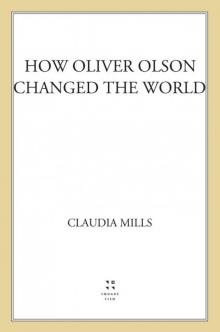 How Oliver Olson Changed the World
How Oliver Olson Changed the World Lizzie At Last
Lizzie At Last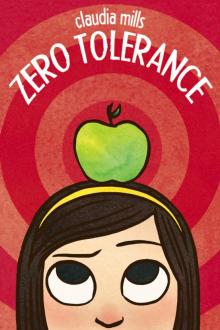 Zero Tolerance
Zero Tolerance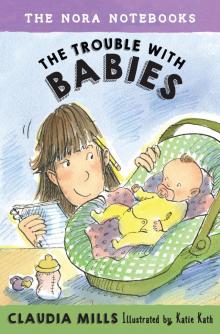 The Nora Notebooks, Book 2
The Nora Notebooks, Book 2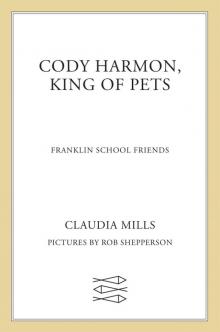 Cody Harmon, King of Pets
Cody Harmon, King of Pets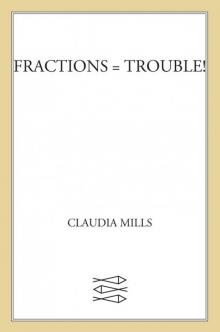 Fractions = Trouble!
Fractions = Trouble!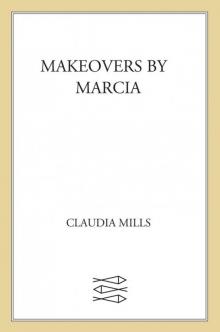 Makeovers by Marcia
Makeovers by Marcia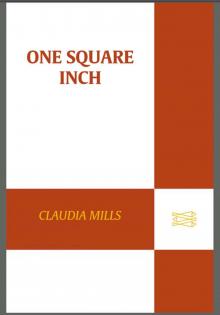 One Square Inch
One Square Inch